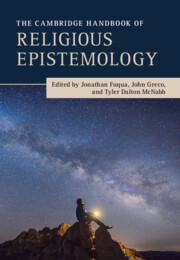Book contents
- The Cambridge Handbook of Religious Epistemology
- Cambridge Handbooks in Philosophy
- The Cambridge Handbook of Religious Epistemology
- Copyright page
- Contents
- Tables
- Contributors
- Introduction
- Part I Faith and Rationality
- Part II Religious Traditions
- 8 Jewish Religious Epistemology
- 9 Christian Religious Epistemology
- 10 Islamic Religious Epistemology
- 11 Hindu Religious Epistemology
- 12 Buddhist Religious Epistemology
- Part III New Directions
- References
- Index
12 - Buddhist Religious Epistemology
from Part II - Religious Traditions
Published online by Cambridge University Press: 24 August 2023
- The Cambridge Handbook of Religious Epistemology
- Cambridge Handbooks in Philosophy
- The Cambridge Handbook of Religious Epistemology
- Copyright page
- Contents
- Tables
- Contributors
- Introduction
- Part I Faith and Rationality
- Part II Religious Traditions
- 8 Jewish Religious Epistemology
- 9 Christian Religious Epistemology
- 10 Islamic Religious Epistemology
- 11 Hindu Religious Epistemology
- 12 Buddhist Religious Epistemology
- Part III New Directions
- References
- Index
Summary
This chapter surveys Buddhist epistemology from the perspectives of early Buddhism, the Pramāṇavāda school, and the Madhyamaka school. These three forms of Buddhism differ considerably in their approaches to epistemology. Early Buddhist epistemology is often regarded as a form of empiricism because of its focus and reliance on personal sensory and supersensory knowledge. The more systematic Pramāṇavāda school exclusively recognizes particulars and universals as the two objects of knowledge corresponding with perception and inference as their respective means of being known. The distinctiveness of the Madhyamaka school is its critical examination of the interdependence of all objects of knowledge and their means, and its focus on two truths as two modes in which things can be known. Although the epistemologies of these three forms of Buddhism have different emphases, they share the aim of furthering the human quest for spiritual liberation.
Keywords
- Type
- Chapter
- Information
- The Cambridge Handbook of Religious Epistemology , pp. 178 - 190Publisher: Cambridge University PressPrint publication year: 2023



